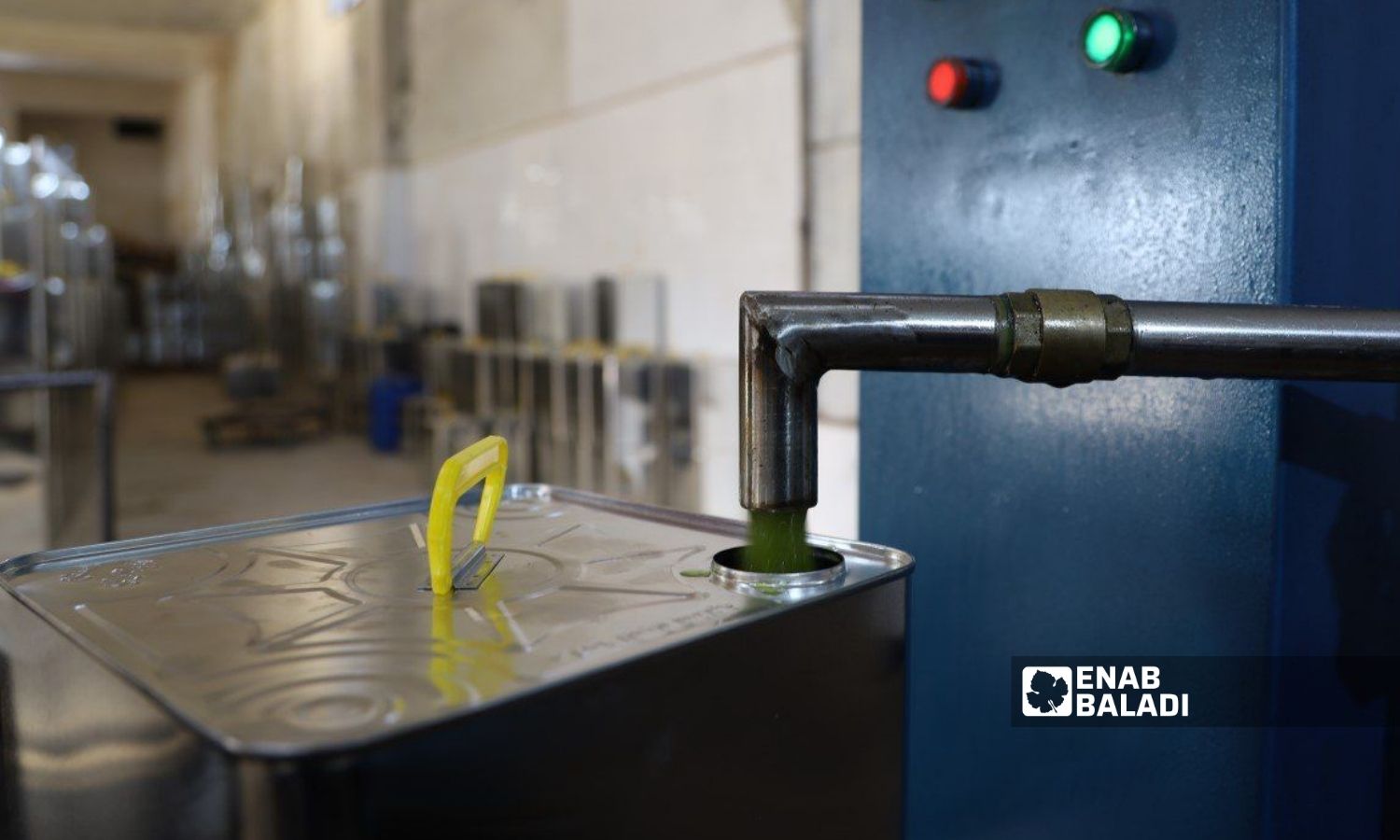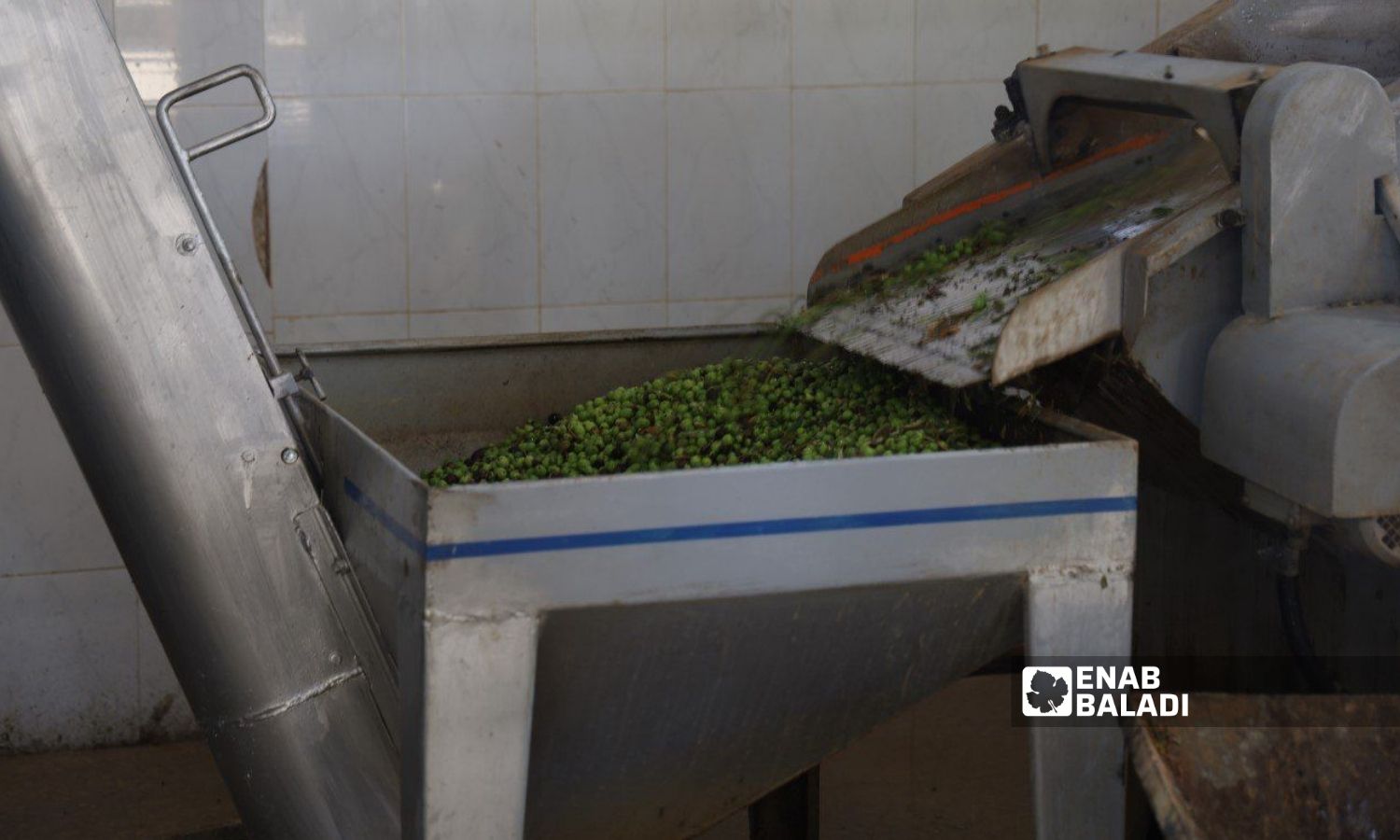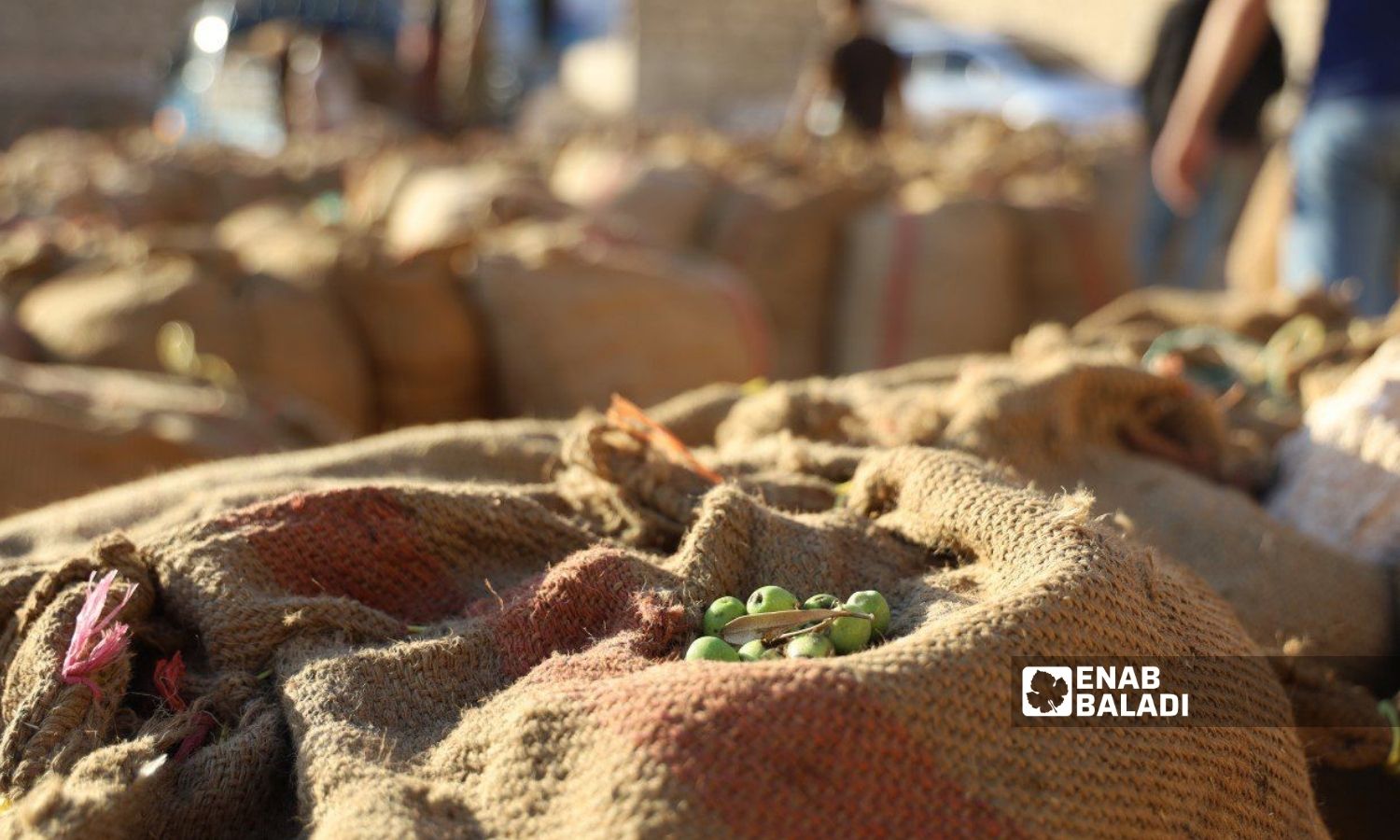



Enab Baladi – Afrin
“46 dollars is a high amount for a tin of olive oil in an area considered the olive spring in Syria”. Words in which the young man, Muhammad al-Hassan, summed up the reasons why his family of five (a wife and three children) limited its consumption to one tank of olive oil per year in the city of Afrin, north of Aleppo, and relied on frying oil as a substitute most days.
The olive tree is one of the most important basic resources on which the population in the north of Syria depends and a livelihood for the owner of the crop and also for workers. Afrin is known for its many olive trees, which cover most agricultural areas. This agriculture ranked first in the region in terms of cultivated areas and production.
Residents in Afrin await the season of olive picking and pressing as an opportunity to secure their supply of oil, anticipating its lower prices as a commodity available in the region.
Olive trees in and around Afrin city number 14,225 million olive trees, according to what the director of the office of the head of the local council in Afrin, Ahmad Hamaher, told Enab Baladi.
The Afrin region is divided into seven sub-districts: Afrin, Sheikh al-Hadid, Maabatli, Sharan, Bulbul, Jindires, and Rajo.
The olive harvest season in Afrin and its environs began last October, as is the case in most areas in Syria, with prices considered high by the people and considered by farmers to be low compared to the costs and the conditions imposed by some factions in the region.

Olive pressing in the city of Afrin, north of Aleppo – 18 October 2022 (Enab Baladi / Amir Kharboutli)
The young man, Muhammad al-Hassan, who was displaced from the Damascus countryside and is currently residing in Afrin, recently bought a 16-kilogram (net weight) tin of olive oil. The price was considered high in the city, which was known for its oil production, on the one hand, and compared with the region’s deteriorating living and economic situation on the other.
The complaint of the day laborer Muhammad al-Hassan is similar to that of Fadi Samou, a resident of Afrin, who needs more than five tanks of olive oil per year.
With a family of four children and a wife, Samou cannot buy his annual supplies at once because their price is high compared to his monthly income (he is also a day laborer); he is forced to buy oil whenever he needs it.
The price of a tin of olive oil ranges between 42 and 47 US dollars (875 Turkish liras), while a kilo of olive oil is sold in shops or popular markets at a price of 4 US dollars (about 75 Turkish liras), thus rising in the case of retail sales.
Prices are determined according to the quality, quantity of acid, and type of olives, such as al-Khalkhali, al-Sourani, and al-Kurdi, which is considered the best in the region. It is sold to merchants and residents of the north and exported outside Syria as well.
The overall salaries of the region’s workforce at daily wages range from 30 to 50 Turkish liras, at an average rate of 1200 Turkish liras per month, while organizations operating in the region set the per-family poverty threshold at 228 USD (equivalent to 4244 Turkish liras) and the extreme poverty threshold at 2542 Turkish liras.

Olives during the harvest season in Afrin, north of Aleppo – 18 October 2022 (Enab Baladi / Amir Kharboutli)
Ahmed Hamou, a landowner and olive merchant in Afrin, considered the price of oil to be too cheap for its production costs in terms of care, fertilizers, workers’ wages, and crop transportation costs.
Hamou explained to Enab Baladi that the olive season is not stable in the production process; production is good for a year and weak the year after.
Farmers in Afrin who were interviewed by Enab Baladi believe that this year’s olive season is promising and has abundant production compared to last year.
Additional costs are added to the farmers in the city of Afrin and its environs with the start of the olive harvest season, such as the payment of royalties under the name of fees and taxes imposed by factions of the Turkish-backed Syrian National Army (SNA) according to testimonies that Enab Baladi had obtained from farmers and owners of presses in the region.
Factions with multiple names and different flags have been imposing royalties that vary from one region to another, and sharing with farmers their possessions and confiscating some of their properties for four years. Despite the existence of institutions and accountability committees, fears prevail amid a state of “security chaos” in the region.
Land royalties vary according to the region and the controlling faction. Some of them have been charging royalties at every stage of harvesting up to the pressing phase, and some are imposing royalties per tree.
Media activist Shero Alou, a non-resident from Afrin, told Enab Baladi that the violations have not stopped since the entry of the SNA factions into the region, as they continue at a varying rate. But they have recently renewed, especially with the start of the olive harvest season.
The activist, who is familiar with the situation in the Afrin region, suggested that these violations would increase in order to collect sums from farmers, as is the case every year. He pointed out that there are great fears of kidnappings in order to collect ransom money after harvesting the olive crops.
The situation is not limited to the imposition of royalties, as the issue of cutting and logging forests and forest trees is renewed by some SNA members with the approach of winter, as in the recent situation in the forests of the Sharan sub-district.
Last August, logging was overseen by elements of the Shuhadaa al-Safira Brigade of the SNA-affiliated Sultan Murad Division, according to a previous report by Enab Baladi based on testimonies from the people of the region and a source from the same faction.
Royalties are not new to the region’s farmers, as the SNA factions imposed them since they took control of Afrin and its surroundings, being backed by the Turkish army in their battles waged against the Syrian Democratic Forces (SDF) that ended on 18 March 2018.
Human rights and humanitarian organizations have documented cases of royalties since the SNA took control of Afrin. Several local authorities and even military institutions have also warned against logging operations in the region and its countryside through accountability, the confiscation of any car loaded with trees, and arresting and holding accountable the responsible party. However, the preventive decisions were not deterrent and were met with factions’ denial of such abuses.
Enab Baladi’s correspondent in Afrin, Amir Kharboutli, contributed to this report.
if you think the article contain wrong information or you have additional details Send Correction